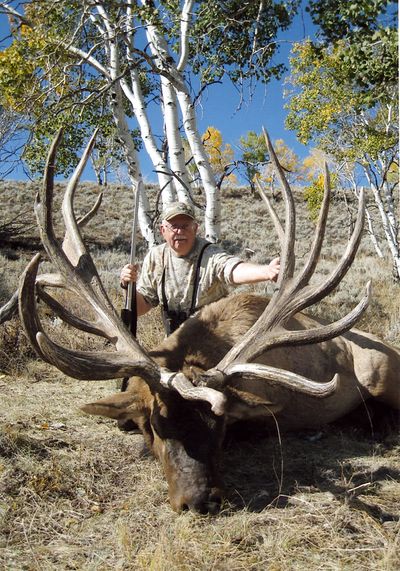UT bull elk confirmed as world record
‘Spider bull’ wild, free-ranging

A behemoth male elk dubbed the “Spider bull,” taken by a hunter on Monroe Mountain in central Utah last fall, carried the largest antler rack ever recorded by the Boone and Crockett (B&C) Club. The elk was officially recognized on Jan. 2 as the new world record for a nontypical American elk.
The antlers also proved to be points of contention among hunters.
The final measurements — 478 5/8 — shattered the existing record of 465 2/8 taken from a bull found frozen in a lake in British Columbia in 1994. The points are based on a combination of measurements from the antlers.
Doyle Moss, head guide for Utah-based MossBack Guides and Outfitters, led hunter Dennis Austad of Ammon, Idaho, to the bull.
“We all knew he was a special bull, but the reality of just how big he was set in when we walked up to him,” Moss said.
Moss stirred controversy with a quick field measurement that turned up a gross score of more than 500 points.
Online hunting forums buzzed with rumors that the bull had escaped from an elk farming ranch or a hunting preserve.
Columnists from national hunting magazines joined the fray and criticized the program that allowed Austad to bid and win a $150,000 elk conservation permit to hunt anywhere in the state for several months.
Money from the permit program funds conservation projects around the state. More than $17 million has been raised by the program in the past 12 years, $2.9 million of it in 2008.
But investigations by the state of Utah and B&C confirmed the animal was wild, was taken on public land and was killed legally, which qualified it for the record.
“We are confident it was not a farmed elk,” said Terry Menlove, director of the animal industry division of the Utah Department of Agriculture. “We keep an inventory and there were no missing animals and it had none of the required markings for an elk on a farm.”
Moss can understand why some people figure the bull must have escaped from a breeding facility. He first heard about the bull when a friend e-mailed him some pictures.
“Even I questioned how he could be so big,” Moss said. “There had never been a bull killed on that mountain that scored 400 inches. It was kind of shocking.”
Moss says anybody who spent time trying to find the bull during hunting season will confirm it was born in the wild.
“After seeing him disappear like he did during the hunts it is easy to see how he could have survived the last couple of years,” Moss said. “He was very nocturnal (during hunting seasons). We would see him the last few minutes of light before dark and at first light, but that was it.”
Jim Karpowitz, DWR director, uses that point to counter the argument that only a hunter with the means to pay $150,000 for a permit and guide fees could take such a trophy.
“All the other permitted hunters — archery, rifle and most of the muzzleloaders — had a crack at that bull,” Karpowitz said. “A lot of other people knew it was there and they all looked for it.”
Austad hunted with MossBack guides for 12 days in early September before other obligations forced him to leave. He managed one shot at the Spider Bull during that time.
A MossBack guide spotted the bull, alive and well, on Sept. 28, two days before Austad was scheduled to return. Early on Sept. 30, the guides led Austad to the area where he bagged the elk.
Karpowitz was impressed with the bull, but said it has never been the agency’s goal to produce a world record.
“Our objective is to maintain healthy population of elk and provide a diversity of hunting opportunities,” he said. “It’s exciting that we produced the largest elk ever known in the wild and an indication of the high quality elk program we have in Utah.”
Washington’s record elk fell in a similar fashion Sept. 2 after Dan Agnew of Tacoma had hired guides to help him locate a known trophy bull in the Dayton Unit of the Blue Mountains. Agnew had paid a record $65,000 in a fundraising auction for the state’s “governor’s elk tag,” which allowed him to hunt bull elk in any open unit and during any open season.
His record 9x10 non-typical American elk has been entered for official certification at 436 2/8 net points and 446 4/8 gross on the B&C scale.